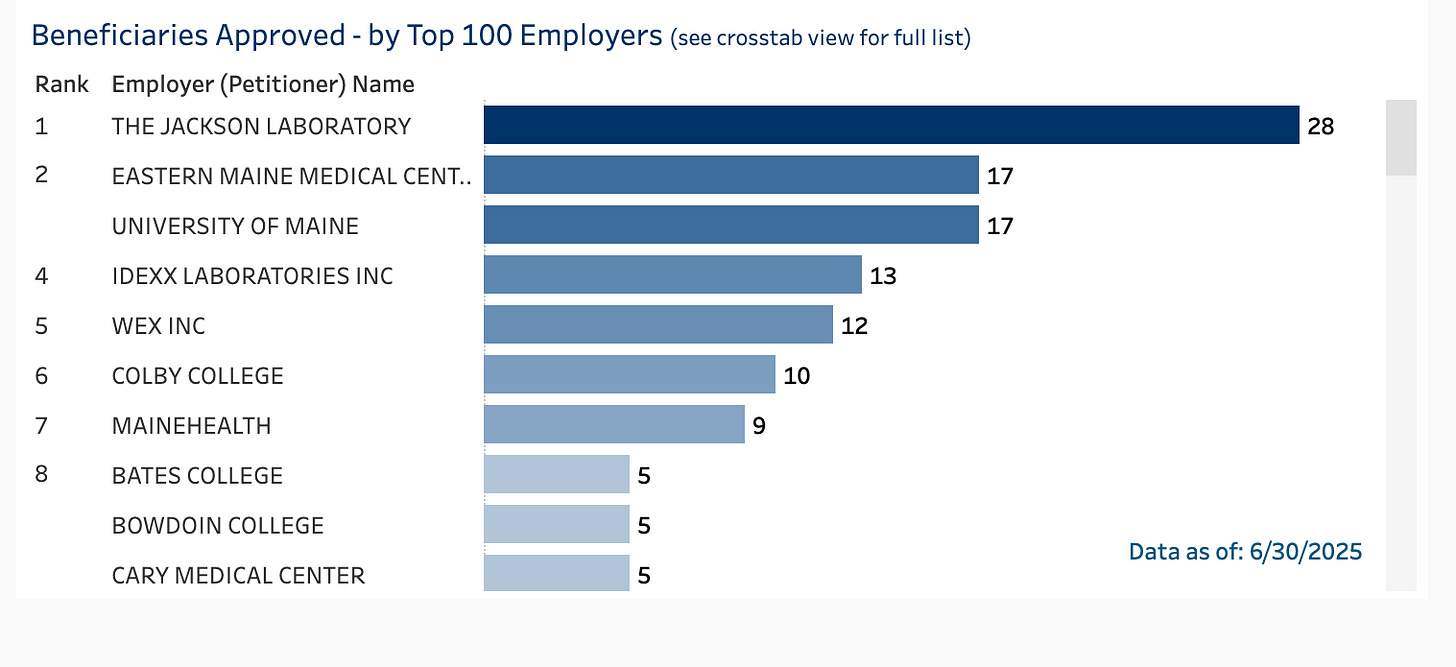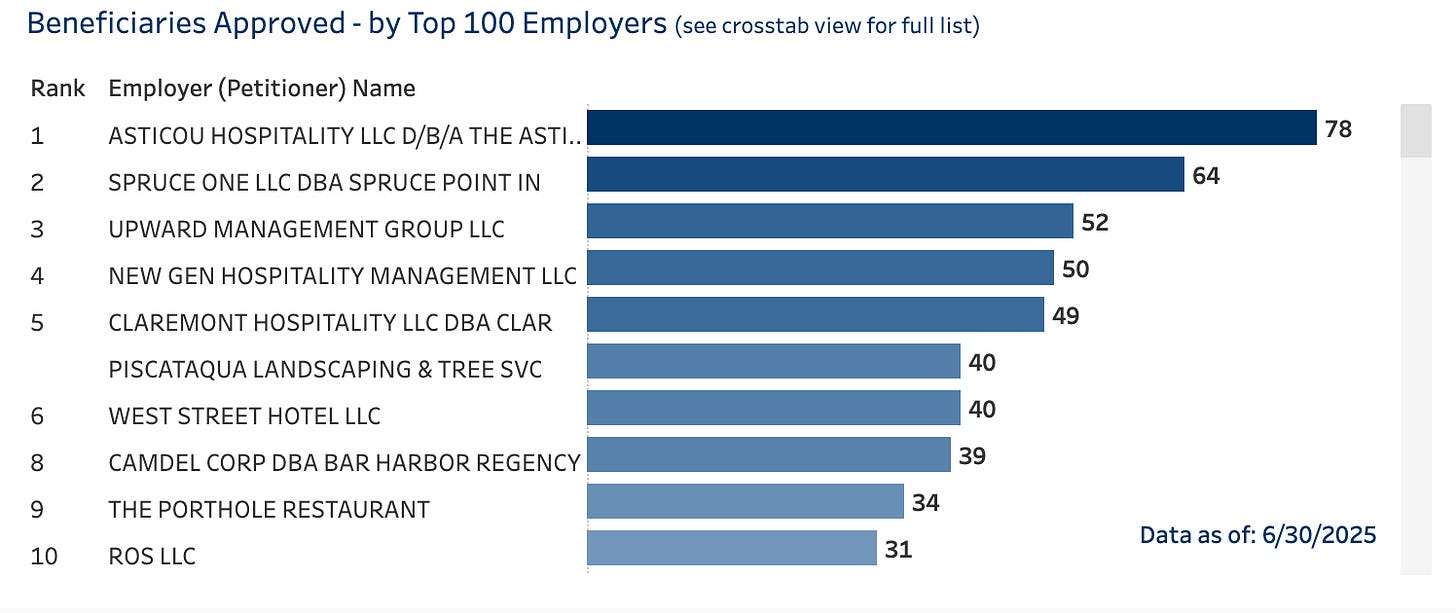JAX Lab is Maine's leader in work program targeted by Trump
BAR HARBOR, Sept. 20, 2025 - The Jackson Laboratory is the largest user in Maine of an immigration work program which the Trump administration is targeting for cutbacks.
According to U.S. government statistics, JAX is by far the leading employer of H1-B visa workers with 28 approved for 2025. Eastern Maine Medical Center and University of Maine have 17 each.
Mount Desert Island Hospital and MDI Bio Labs each has one.
Donald Trump signed a proclamation on Friday that would impose an annual $100,000 fee on H-1B visa applications, dealing a potentially major blow to the US tech industry, which relies heavily on workers from India and China.
The US commerce secretary, Howard Lutnick, said at a Friday press briefing that “all the big companies” had been briefed on the new fee.
“A hundred-thousand dollars a year for H-1B visas, and all of the big companies are on board. We’ve spoken to them,” Lutnick said at an Oval Office event with the US president.
“If you’re going to train somebody, you’re going to train one of the recent graduates from one of the great universities across our land. Train Americans. Stop bringing in people to take our jobs,” he said.
According to the Guardian newspaper, Trump’s threat to crack down on H-1B visas has become a major flashpoint with the tech industry, which contributed millions of dollars to his presidential campaign. The tech industry relies, more than any other sector of the US economy, on H-1B visa holders. Roughly two-thirds of jobs secured through the H-1B program are computer-related, government figures show, but employers also use the visa to bring in engineers, educators and healthcare workers.
In the first half of 2025, Amazon had more than 10,000 H-1B visas approved, while Microsoft and Meta Platforms had more than 5,000 approvals each. The H-1B program offers 65,000 visas annually to employers bringing in temporary foreign workers in specialized fields, with another 20,000 visas for workers with advanced degrees.
Critics of the program, including many US technology workers, argue that it allows firms to suppress wages and sideline Americans who could do the jobs. Supporters, including Tesla CEO Elon Musk, say it brings in highly skilled workers essential to filling talent gaps and keeping firms competitive. Musk, himself a naturalized US citizen born in South Africa, once held an H-1B visa.
Adding new fees “creates disincentive to attract the world’s smartest talent to the US”, Deedy Das, partner at venture capital firm Menlo Ventures, wrote on X. “If the US ceases to attract the best talent, it drastically reduces its ability to innovate and grow the economy.”
H-1B fees are typically paid for by employers sponsoring visa applicants. It currently costs $215 to enter an applicant into the lottery, and more than $5,000 in fees to file a visa application—without factoring in lawyers’ fees, according to the Wall Street Journal.
It isn’t clear whether the White House’s latest actions will face legal challenges. Typically, new visa fees must either be set by Congress or be levied through formal regulations, which first undergo months of public notice and comment, the Journal reported.
Adam Kovacevich, head of pro-tech group Chamber of Progress, said the increased fees on H-1B visas would likely stop many companies from using them, especially smaller companies with limited resources. The new policy could also make it harder for the U.S. to compete with China in developing technologies like artificial intelligence.
“I strongly suspect the administration is going to realize in the coming days and weeks that this policy clashes with his stated goal of winning the AI race,” he told the Journal.
The move is the latest effort by the Trump administration to curb, or raise more money from legal immigration. Last month, the US launched a pilot program allowing consular officers to demand bonds of up to $15,000 for tourist and business visas from countries with high overstay rates or limited vetting data. That followed Trump’s June travel ban restricting entry from 19 nations. Trump’s first-term administration issued several regulations that aimed to limit access to H-1B visas and give them to higher-paying employers, but the regulations were blocked in federal court.
The H-1B visa is for highly skilled workers, often in specialized fields like IT, engineering, or healthcare. It requires a bachelor’s degree or higher and is often used for long-term employment. The H-2B visa, on the other hand, is for temporary non-agricultural jobs, typically in industries like hospitality, landscaping, or construction. Unlike the H-1B, the H-2B does not require advanced education or specialized skills.
Three MDI hotels are in the Top 10 employers of H-2B visa holders in Maine. The Asticou Hotel in Northeast Harbor is No. 1 at 78 workers. Claremont Hotel in Southwest Harbor and West Street Hotel in Bar Harbor are Nos. 5 an 6.
Jackson Lab is still adjusting to the cuts to National Institute of Health grants announced earlier this year of 60 percent or more.
The laboratory provides more than 13,000 strains of mouse models to more than 2,400 organizations in 68 countries around the world. It employs nearly 3,000 people at 11 locations in Maine, Connecticut, California, Japan and in remote locations around the world.


